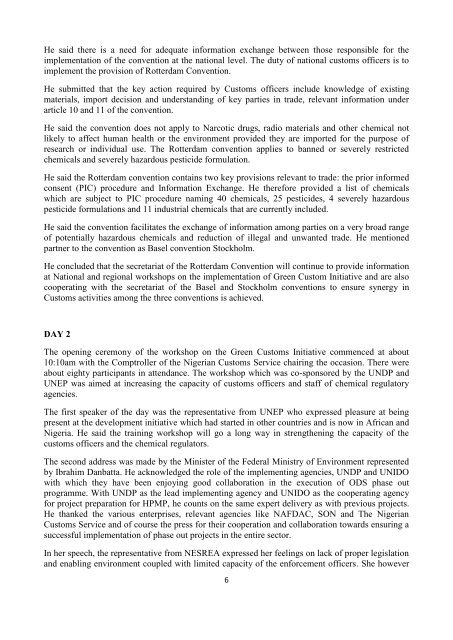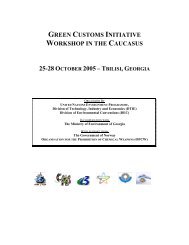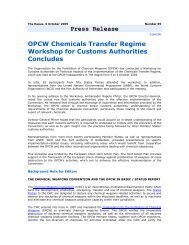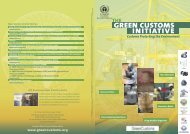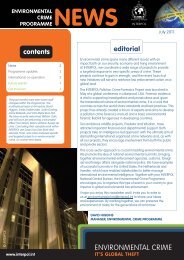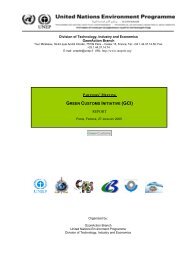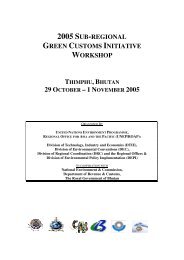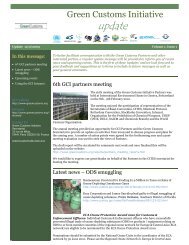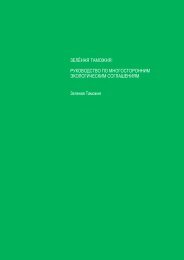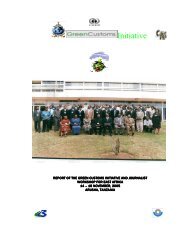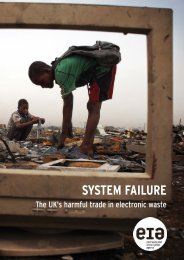workshop report. - Green Customs Initiative
workshop report. - Green Customs Initiative
workshop report. - Green Customs Initiative
Create successful ePaper yourself
Turn your PDF publications into a flip-book with our unique Google optimized e-Paper software.
He said there is a need for adequate information exchange between those responsible for theimplementation of the convention at the national level. The duty of national customs officers is toimplement the provision of Rotterdam Convention.He submitted that the key action required by <strong>Customs</strong> officers include knowledge of existingmaterials, import decision and understanding of key parties in trade, relevant information underarticle 10 and 11 of the convention.He said the convention does not apply to Narcotic drugs, radio materials and other chemical notlikely to affect human health or the environment provided they are imported for the purpose ofresearch or individual use. The Rotterdam convention applies to banned or severely restrictedchemicals and severely hazardous pesticide formulation.He said the Rotterdam convention contains two key provisions relevant to trade: the prior informedconsent (PIC) procedure and Information Exchange. He therefore provided a list of chemicalswhich are subject to PIC procedure naming 40 chemicals, 25 pesticides, 4 severely hazardouspesticide formulations and 11 industrial chemicals that are currently included.He said the convention facilitates the exchange of information among parties on a very broad rangeof potentially hazardous chemicals and reduction of illegal and unwanted trade. He mentionedpartner to the convention as Basel convention Stockholm.He concluded that the secretariat of the Rotterdam Convention will continue to provide informationat National and regional <strong>workshop</strong>s on the implementation of <strong>Green</strong> Custom <strong>Initiative</strong> and are alsocooperating with the secretariat of the Basel and Stockholm conventions to ensure synergy in<strong>Customs</strong> activities among the three conventions is achieved.DAY 2The opening ceremony of the <strong>workshop</strong> on the <strong>Green</strong> <strong>Customs</strong> <strong>Initiative</strong> commenced at about10:10am with the Comptroller of the Nigerian <strong>Customs</strong> Service chairing the occasion. There wereabout eighty participants in attendance. The <strong>workshop</strong> which was co-sponsored by the UNDP andUNEP was aimed at increasing the capacity of customs officers and staff of chemical regulatoryagencies.The first speaker of the day was the representative from UNEP who expressed pleasure at beingpresent at the development initiative which had started in other countries and is now in African andNigeria. He said the training <strong>workshop</strong> will go a long way in strengthening the capacity of thecustoms officers and the chemical regulators.The second address was made by the Minister of the Federal Ministry of Environment representedby Ibrahim Danbatta. He acknowledged the role of the implementing agencies, UNDP and UNIDOwith which they have been enjoying good collaboration in the execution of ODS phase outprogramme. With UNDP as the lead implementing agency and UNIDO as the cooperating agencyfor project preparation for HPMP, he counts on the same expert delivery as with previous projects.He thanked the various enterprises, relevant agencies like NAFDAC, SON and The Nigerian<strong>Customs</strong> Service and of course the press for their cooperation and collaboration towards ensuring asuccessful implementation of phase out projects in the entire sector.In her speech, the representative from NESREA expressed her feelings on lack of proper legislationand enabling environment coupled with limited capacity of the enforcement officers. She however6


